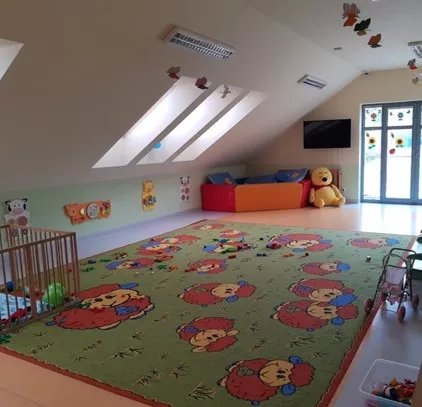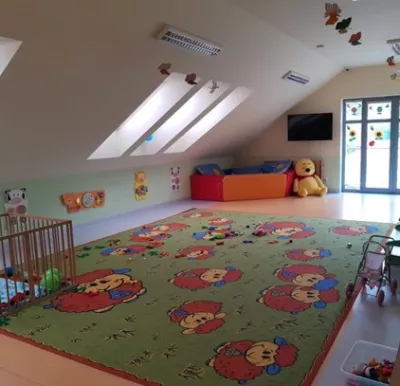Summary
Biczyce Dolne is a village in the municipality of Chełmiec, in southern Poland, with a population of 765. A European Social Fund (ESF) project enabled the creation of the nursery 'Rainbow hut’.
The objective was not only to create this missing service in the village, but also to promote equal opportunities in access to employment between women and men, after breaks for taking care of children up to three years of age, among project participants who are unemployed or on parental leave and living, working or studying in Chełmiec municipality.
The project resulted in the creation of the nursery, which now offers 25 places, as well as the purchase of equipment necessary to care for small children and, through education classes, the training of unemployed professionals in the childcare sector.
So far 20 residents using the nursery services have returned to the labour market after long breaks related to childbirth/child rearing and five people have found jobs following the education programme.
Results
The nursery offers 25 places for children of up to three years of age, employs five people and enables 20 residents of this rural area to return to work. This simple, yet impactful initiative, aimed at ensuring access to services for families, has brought attention to the work of the LAG within the local community.
It has also facilitated new collaborations with other municipalities and organisations in the area, all with the goal of creating a comprehensive strategy for work-life balance and addressing depopulation.
By the end of 2023, the LAG has worked as a partner in several nurseries accommodating a total of 70 children under the age of three and 250 children aged five to six.
Resources
Documents
Context
In Chełmiec, the largest rural municipality in the Małopolska region, women comprise 60% of the unemployed population. In this area, there are over 900 children under the age of three, yet, ahead of the project, there was only one nursery available.
This poses a major barrier for many families and disproportionately impacts women, as a higher number of them opt not to return to work after childbirth due to the lack of available support.
Objectives
The main objective was to establish a nursery providing access to childcare for parents of children of up to three years of age, and catering to the needs of rural families, particularly women, who traditionally bear the heaviest childcare responsibilities.
This initiative aimed to prevent further depopulation of the area by offering an alternative to relocating to areas with better access to services.
Activities, key actors, and timeline
The main tasks in the project, led by the Local Action Group (LAG) in cooperation with other public and private organisations, included equipment procurement, hiring qualified personnel and organising care and educational activities.
The financial stability for the project was achieved through the Chełmiec municipality which passed a resolution to provide a dedicated subsidy from its budget for each child in the nursery. The building where the nursery operates also belongs to this public authority, which loaned it for free to the LAG for the purpose of this project.
To operate the nursery, the project began by hiring four caregivers and a nurse who received training on play activities with educational elements, tailored to the individual needs of each child. As a result, the nursery now operates from Monday to Friday, with hours extending from 6.30 AM to 5.00 PM.
Success factors/Lessons learnt
This initiative was born out of a genuine community need identified by LAG 'KORONA SĄDECKA', an organisation with prior experience operating a nursery and kindergarten, thus earning the trust of local residents. Since 2010, the LAG has consistently carried out educational projects, establishing a reputable brand that has attracted new mothers and their children.
In rural areas lacking essential services, this initiative can be seen as innovative. It represents a form of social innovation wherein a LAG, functioning as a non-governmental organisation, creates a childcare facility that addresses the challenge of balancing work and family life.
What sets this project apart is its sustainability beyond EU support, made possible through a valuable partnership with the local municipality. The municipality's contribution, providing a fully adapted building for the nursery, underscores the added value of collaboration. Such partnerships, although relatively rare in rural areas, are highly desirable and can serve as replicable models for other municipalities.
The establishment of this nursery has contributed significantly to the sustainable development of the community, particularly in the social dimension. By promoting the harmonisation of work and family life in public policies and by providing corresponding financial support, the nursery's operations have achieved financial sustainability.
Contacts
LAG 'KORONA SĄDECKA': zlobki.lgd@interia.pl

